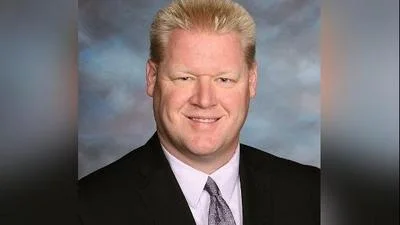Rob Hutton, Wisconsin State Senator for 5th District | Facebook
Rob Hutton, Wisconsin State Senator for 5th District | Facebook
According to the Wisconsin State Legislature's official website, the bill was described as follows: "Department of Justice collection and reporting of certain criminal case data. (FE)".
The following is our breakdown, based on the actual bill text, and may include interpretation to clarify its provisions.
In essence, this bill mandates the Wisconsin Department of Justice to gather specific data for each criminal case filed in the state's circuit courts. It requires collecting details such as the case's location, prosecuting attorney, court official, charges, release conditions, whether plea bargains or deferred prosecution agreements were offered, any dismissals, and case convictions. This information, provided by the director of state courts, will be maintained in a DOJ database available for 10 years, ensuring no personally identifying data of defendants is included. The DOJ will report this data annually to legislative committees. The act is set to be effective on the first day of the seventh month following its publication.
The bill was co-authored by Representative Bob G. Donovan (Republican-61st District), Senator Jesse L. James (Republican-23rd District), Senator Steve L. Nass (Republican-11th District), Senator Cory Tomczyk (Republican-29th District), Senator Van H. Wanggaard (Republican-21st District). It was co-sponsored by Representative Elijah R. Behnke (Republican-6th District), Representative Daniel Knodl (Republican-24th District), and Representative Clint P. Moses (Republican-92nd District), along four other co-sponsors.
Rob Hutton has authored or co-authored another 18 bills since the beginning of the 2025 session, with none of them being enacted.
Hutton graduated from the University of Wisconsin-Whitewater in 1990 with a BA.
Hutton, a Republican, was elected to the Wisconsin State Senate in 2023 to represent the state's 5th Senate district, replacing previous state senator Dale Kooyenga.
In Wisconsin, the legislative process starts when a senator, constituent, group, or agency proposes an idea for a bill. After drafting, the bill is introduced, numbered, and referred to a committee for review and public input. If approved, it moves through three readings and votes in both the Senate and Assembly. Once both chambers pass the same version, the bill goes to the governor, who can sign it, veto it, or let it become law without a signature. Only a small share of bills introduced each session ultimately become law. You can learn more about the Wisconsin legislative process here.
| Bill Number | Date Introduced | Short Description |
|---|---|---|
| SB115 | 03/07/2025 | Department of Justice collection and reporting of certain criminal case data. (FE) |
| SB105 | 03/07/2025 | Jailers and protective occupation annuitants in the Wisconsin Retirement System who are rehired by a participating employer. (FE) |
| SB98 | 03/07/2025 | Conversion of cooperative associations organized to establish and operate nonprofit plans or programs for health care into service insurance corporations |
| SB93 | 03/07/2025 | Recommendation to revoke extended supervision, parole, or probation if a person is charged with a crime. (FE) |
| SB92 | 03/07/2025 | Theft crimes and providing a penalty. (FE) |
| SB76 | 02/26/2025 | Dismissing or amending certain criminal charges and deferred prosecution agreements for certain crimes |
| SB38 | 02/12/2025 | Personalized registration plate fees for gold star family special registration plates. (FE) |
| SB25 | 02/05/2025 | Court-issued criminal complaints in officer-involved deaths |






 Alerts Sign-up
Alerts Sign-up